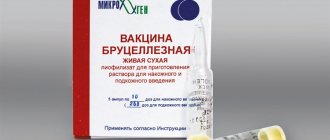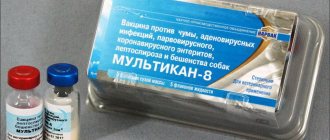According to statistics, in half of the cases of hospitalization of young children with signs of acute intestinal diseases, the cause is rotavirus enteritis. The problem is especially relevant for children under the age of about five years, who get sick more often than other age groups and have difficulty coping with the disease. The disease is dangerous because it can lead to dehydration due to severe vomiting, diarrhea and fever.
To protect babies, special vaccines have been developed, one of which, Rotatek, is successfully used all over the world. This is what is used at the Gorbakov Clinic for vaccination against rotavirus.
Vaccine composition
The drug "Rotatek" is produced by the American corporation "Merck Sharp and Dome" in the Netherlands. It contains live cultures of rotaviruses of five different subtypes, as well as safe excipients necessary to maintain the functionality of microorganisms.
The above-mentioned vaccine is produced through genetic engineering. It is based on a combined rotavirus, which contains sections of the genome that provoke an optimal immune response. This approach makes it possible to obtain high protection against viruses, since the latter regularly change their antigenic structure due to variability.
Are there any complications?
The vaccination itself is tolerated quite easily by children. This is the safest vaccine that is given by mouth. The vaccine is live, so it still has some contraindications, like any other live vaccine.
Consequences after vaccination can only occur if the person was not completely healthy when brought to be vaccinated, for example, he has symptoms of a respiratory infection. In this case, mild diarrhea may appear as a side effect, but nothing more. There will be no local reactions, because this is not an injection.
How is vaccination performed?
The timing of vaccination is determined by the pediatrician individually, since this vaccination is not included in the Calendar. Professor Gorbakov’s Clinic adheres to the recommendations from the instructions, so immunization is most often structured according to the following scheme:
- between six and twelve weeks of age, the baby receives the first dose;
- the recommended interval between vaccinations is from four to ten weeks;
- to form long-lasting immunity, the vaccine must be administered three times in a row - up to 8 months of age;
- In the case of this virus, revaccination is not necessary.
It is most convenient to combine immunization against rotavirus with routine vaccinations at three, four and a half and six months. If there is a need for early protection against rotavirus, the timing can be shortened: 6, 14, 22 weeks. It is not advisable to administer the first dose after 15 weeks of birth. However, if this happens, in the future it is worth reducing the interval to a minimum of four weeks.
Vaccination calendar
Since 2006, the whole world has been massively vaccinated against rotavirus, and today such a vaccine is often included in various national calendars. In Russia, due to epidemiological indications, it has also been used for quite a long time - for at least 5-7 years. So far in a small number of regions, for example Moscow, Moscow region, Khanty-Mansi Autonomous Okrug. Here it is purchased at the expense of the local budget. The number of regions in which vaccination against rotavirus infection is being introduced is gradually increasing.
What vaccinations do adults and children need? Vaccination calendar Read more
Effectiveness of vaccination
After three administrations, Rotatek forms immunity in the child during the most critical period - up to about five years. Like other vaccines, it does not provide 100% guarantee and protection, but it seriously facilitates the process of intestinal flu and significantly reduces the likelihood of serious complications.
After administration, the child’s body develops protection against all G-serotypes of the virus, including those that are not included in the drug. During the first season, the effectiveness of the immune response to severe rotavirus reaches 97%, and during the next two it is about 70%.
A high-quality and safe genetically engineered vaccine called “Rotatek” is easily tolerated by the body of a small child and forms stable protection. At the Gorbakov Clinic, vaccination is carried out under the supervision of experienced pediatricians, and upon completion, parents receive qualified recommendations and answers to any questions.
Who needs it
According to statistics, every child in the world, regardless of what country he lives in, experiences rotavirus gastroenteritis at least twice before the age of 5. The most problematic category of children is babies under one year of age, because in them such an infection is extremely severe. It should be understood that every day 4.5 thousand children die from acute diarrhea in the world. And children under 5 years of age are considered the most vulnerable category. Accordingly, vaccination helps protect them from severe and deadly pathology.
The vaccine is given mainly at two months of age; then the number of revaccinations depends on the type of vaccine. In Russia, one vaccine is registered, which is administered three times with an interval of 4-10 weeks, starting from the age of 6-12 weeks. There is no point in giving the vaccine to older children, since they usually manage to recover from rotavirus infection by the age of one and receive a certain set of antibodies.
The vaccine itself contains a weakened pathogen that promotes the development of immunity. Accordingly, when a vaccinated person later encounters an infection, the body recognizes it at the cellular level and fights it.
How is rotavirus different from norovirus? More details
How dangerous is rotavirus infection for children under 5 years of age?
The incubation period of rotavirus is short, only 1–4 days. Therefore, viruses very quickly destroy the normal functioning of the intestines, forcing it to pump out water and microelements from the baby’s body - in particular, potassium and magnesium, which are necessary for the normal functioning of the heart. This leads to a rapid increase in weakness.
To recover and reduce the symptoms of intoxication, the child must drink plenty of fluids and replenish lost minerals. But at the same time you have to drink literally 50 ml, since taking the same rehydron in large volumes can provoke vomiting. High temperature also significantly worsens the condition of the baby.
Vaccination against rotavirus infection
Credits : Centers for Disease Control and Prevention (CDC)
The best way to protect a child from rotavirus infection is vaccination. Doctors recommend that all children receive this vaccination.
Why should my child be vaccinated against rotavirus?
Vaccine against rotavirus infection:
- protects your child from rotavirus infection, a potentially serious illness;
- prevents your child from developing diarrhea, vomiting and stomach pain caused by rotavirus infection;
- will not allow your child to miss school or kindergarten, and you will not miss your work while caring for a sick child at home.
Is the rotavirus vaccine safe?
The rotavirus vaccine is safe and effective and prevents the disease caused by the virus. Each RotaTeq® and Rotarix® test involved more than 70,000 volunteers. Millions of children in the United States have already received the vaccine during their mandatory vaccinations, and there have been no reported complications with its administration.
What are the side effects of rotavirus vaccination?
Side effects are rare and usually short-lived: minor restlessness, fever and diarrhea.
Some studies have shown a slight increase in the incidence of intussusception in infants within a week of receiving the first or second dose of rotavirus vaccine. Intussusception is a type of intestinal obstruction that requires hospital treatment. Studies estimate the risk of this happening to be 1 in 20,000 to 100,000 infants after vaccination.
Today there are two types of rotavirus vaccines - RotaTeq and Rotarix.
Both vaccines must be taken orally rather than by injection. What is rotavirus?
Rotavirus is a virus that causes severe diarrhea and vomiting. It mainly affects infants and young children. Diarrhea and vomiting can lead to severe dehydration, which can be fatal if not treated promptly, especially in young children.
What are the symptoms of rotavirus infection?
Rotavirus causes the following symptoms:
- fever;
- watery diarrhea;
- vomit;
- abdominal pain.
Diarrhea and vomiting usually last from 3 to 8 days, with children sometimes stopping eating and drinking altogether while they feel unwell, which can have serious consequences.
This is serious?
Rotavirus can be very dangerous. Diarrhea, vomiting and fever can cause severe loss of body fluids, and dehydration is very dangerous for infants and young children. Children who refuse to eat or drink at home may need intravenous medications in a hospital setting to replace fluids lost.
How does rotavirus spread?
Rotavirus spreads very quickly because the pathogen is found in the stool of people who are infected with the virus. Spread: Contaminated hands, diapers or shared objects such as toys, changing tables or doorknobs. The disease usually strikes with lightning speed everyone who does not have immunity to it, in families, hospitals and children's institutions.
Unfortunately, rotavirus is very resistant to environmental factors. It can remain active on various objects for several days if it is not neutralized with a disinfectant (meaning a detergent or cleaner that kills germs). But even with hand washing and cleaning common objects with disinfectants, it is very difficult to prevent rotavirus infection.
published 05/23/2017 12:17 updated 06/07/2017 — Infectious diseases
Recovering from COVID is a different disease. Is vaccination not a panacea?
Every day there is a new discovery about coronavirus. And now the professor has said that ARVI can be a salvation from coronavirus. Is there any sensation in this? Opinions will certainly vary. As well as thinking about whether widespread vaccination is necessary.
Citizens who have a cold or acute respiratory viral infection cannot also become infected with coronavirus infection. This was stated in an interview with Ura.ru by the head of the cell proliferation laboratory at the Engelhardt Institute of Molecular Biology, Pyotr Chumakov.
The problem is that after recovery, the person’s immunity will be weakened. Therefore, he can easily catch COVID-19. It is possible that we are talking about a more severe form. Why can’t a patient become infected with a second virus? The thing is that the body produces an antiviral protein.
Because interferon is released, an antiviral protein that protects the body from secondary infection,” the professor pointed out.
Doctor of Sciences Vladislav Shafalinov is also critical of mixed infections. He shared his position on the air of the “Truth Vaccine” program on Russian First.
Flu, coronavirus, mixed infection. Is it time to panic?
Will the mix of Covid and flu become a deadly cocktail and is it really possible to combine infections? Doctor of Medical Sciences Vladislav Shafalinov adheres to the following position:
Respiratory infections are dangerous because they can lead to death or some complications. Let’s speak objectively: in general, influenza and Covid do not cause severe illness, and their mortality rate is comparable. Official statistics indicate a 2% mortality rate in the coronavirus pandemic and 1% mortality rate in the flu. And if you go by the numbers, coronavirus is more dangerous. In addition, it is more difficult to tolerate since we encountered it for the first time. And I had the flu every year, and it was quite easily tolerated.
Dr. Shafalinov does not believe in the deadly cocktail “flu plus Covid”:
I don't think this will happen. And the flu does not pose a danger to those who have had a normal coronavirus infection.
Indeed, a number of experts are of the opinion that, having caught the coronavirus, a weakened body can also become infected with the flu. Or a person may become ill with one or another infection, having barely recovered from the previous one. Dr. Shafalinov believes that when analyzing such statements, panic sentiments should be discarded:
Why did we decide that the immunity of those who have suffered from coronavirus will be lowered? By the way, on the contrary, I think that resistance is normal. For example, I myself suffered a coronavirus infection and I think that I can easily cope with the flu. But vaccinated people are a separate issue. Because it is known that any vaccine reduces the body’s nonspecific resistance.
In light of this, Dr. Shafalinov also spoke about the large number of cases of coronavirus between the first and second vaccinations. The body is weakened, during this period it manages to catch the virus:
This suggests that after vaccination, immunity decreases.
Meanwhile... COVID has opened the way for the most severe childhood virus
Coronavirus has caused the spread of a rare and little-known respiratory syncytial virus around the world. Many cases have already been recorded in the USA, Switzerland, Great Britain, and Japan.
At the same time, there have been no mass outbreaks of the disease before; cases were rare. However, the coronavirus has opened the door for a new virus to infect children.
According to the BBC, the children were quarantined and spent a long time at home. As a result, they simply could not form immunity to this virus. Now it is spreading incredibly fast.
The virus has been known for a long time, but usually there have been no problems with it. It affects the respiratory tract and causes serious complications. Some children require intensive care as a result.
Thus, in Switzerland the medical system was not prepared for such a shock. There are too many sick children, and the healthcare system cannot cope with this flow of people infected with a long-known virus.
Efficiency
11. Vaccines for preventing rotavirus diarrhoea: vaccines in use. (Soares-Weiser, 2012, Cochrane Database Syst Rev) Cochrane systematic review. In developed countries, vaccination reduces the risk of diarrhea by about 40% and the risk of severe rotavirus diarrhea by 86%.
Vaccination was not found to reduce mortality.
Serious adverse events (SAEs) were reported in 4.6% of Rotarix recipients and 2.4% of Rotatec recipients. A similar number of SAEs were reported in the placebo groups.
12. Cost-effectiveness and potential impact of rotavirus vaccination in the United States. (Widdowson, 2007, Pediatrics) Rotavirus vaccination in the United States will prevent 63% of all rotavirus cases, and 79% of all serious cases. This would result in 13 deaths and 44,000 hospitalizations averted per year.
If the price of a vaccine dose is more than $12, vaccination will not be economically justified from a public health point of view, and if the price of a dose is more than $42, it will not be justified from a social point of view. Today Rotatek costs $69-$83 per dose, and Rotarix $91-$110. 1 more].
13. Effectiveness of monovalent rotavirus vaccine (Rotarix) against severe diarrhea caused by serotypically unrelated G2P[4] strains in Brazil. (Correia, 2010, J Infect Dis) In Brazil, the rotavirus strain G2P[4], which was found in 19%-30% of cases before the start of vaccination, replaced all other strains within 15 months after the start of vaccination. The effectiveness of the vaccine (Rotarix) against this strain was 77% among children 6-11 months, and -24% (negative) among children over 12 months. More: [1], [2].
It is reported here that after the start of vaccination in Brazil, conventional rotavirus strains were replaced by a new strain, G12P[8]. Strain replacement also occurred in Paraguay and Argentina.
14. Effectiveness of the monovalent rotavirus vaccine in Colombia: a case-control study. (Cotes-Cantillo, 2014, Vaccine) The effectiveness of the vaccine (Rotarix) in Colombia among children 6-11 months was 79%; from severe cases of diarrhea 63%; and from very severe cases 67%. Efficacy among children over 12 months was -40%; from severe cases -6%; and from very severe cases -156% (negative effectiveness). Overall vaccine effectiveness for all ages was -2%; from severe cases -54%; and from very severe cases -114% (negative effectiveness). It reports here that in central Australia, the effectiveness of two doses of Rotarix was 19%, and the effectiveness of one dose was nil.
It is reported here that there is no correlation between the amount of antibodies produced and the clinical effectiveness of the vaccine.
15. Differentiation of RotaTeq® vaccine strains from wild-type strains using NSP3 gene in reverse transcription polymerase chain reaction assay. (Jeong, 2021, J Virol Methods) The authors analyzed stool from 1,106 infants with gastroenteritis and found group A rotavirus in a quarter of them. 13.6% of the detected strains were vaccine strains.







